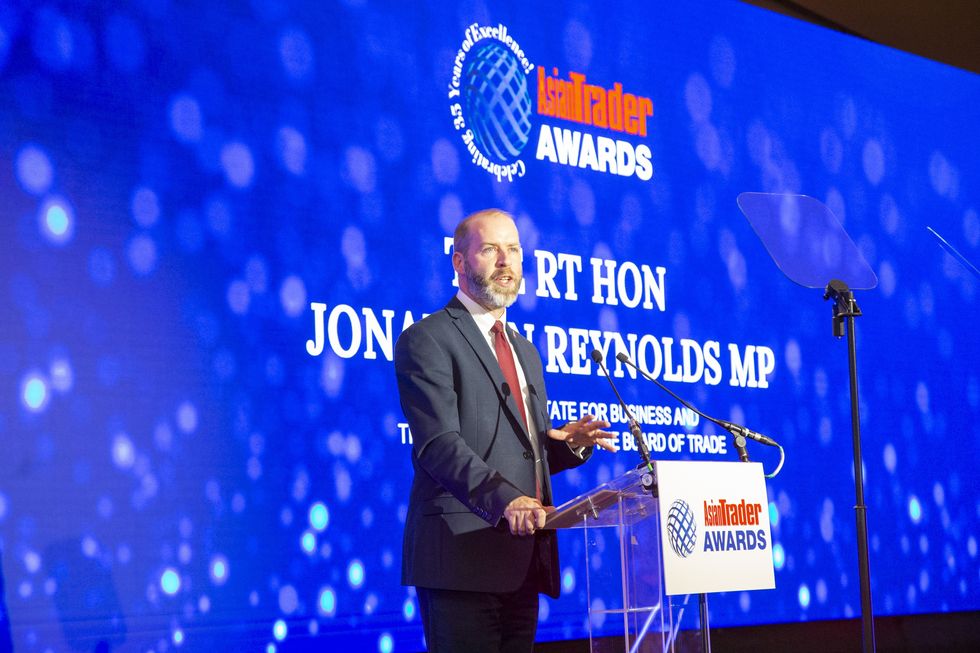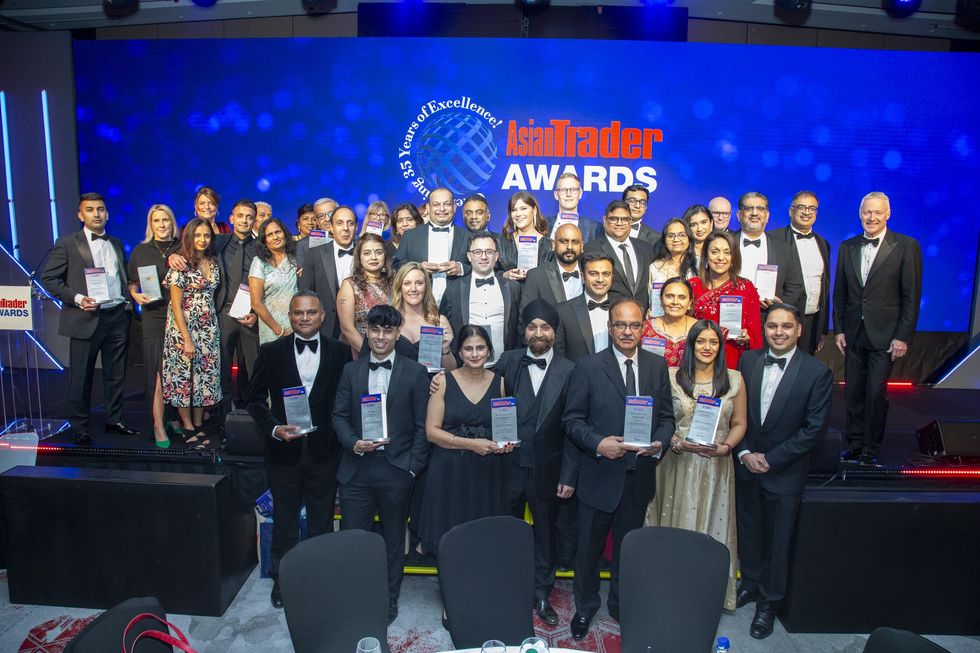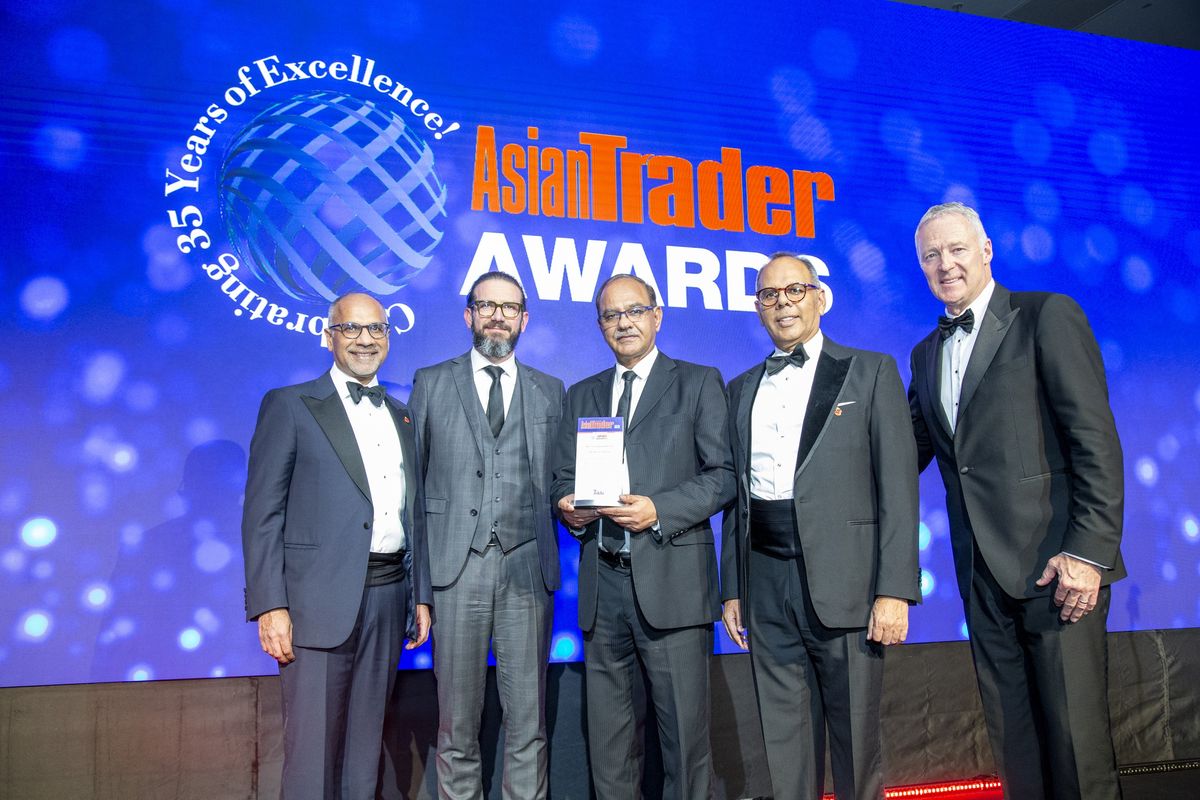Bestway Glasgow Sher deport on Kilbirnie Street, Glasgow has won the Wholesale Depot of the Year award, supported by Tilda, at the 2024 Asian Trader Awards ceremony held on 5 November at London's Park Plaza Westminster Bridge hotel.
Bestway Sher is a dynamic and innovative depot that invests in its staff and new technology to ensure the very best service for its more than 3000 customers.
Using the latest digital technology and social media, the depot targets individual customers with special offers based on precise differential criteria. The depot is well merchandised with numerous branded bays dedicated to specific suppliers to highlight the category, their best deals and fast or new product lines.
Manager Aftab Mohammed has managed to maintain 97 per cent product availability, with sales split sales split 60 / 40 between foodservice and retail.
At Bestway Sher, new staff are “buddied-up” with an experienced team member and undergo training on all aspects of operational procedure. Above all, the depot works seamlessly with its suppliers, and Mohammed stresses that that the strong relationships and harmonious working with manufacturers really helps achieve depot goals.

Business secretary Jonathan Reynolds attended as chief guest at the ceremony, which celebrated excellence in convenience retail across the UK. The event marked its 35th anniversary this year, continuing its tradition of recognising outstanding achievements in the sector.
Speaking at the event, Shefali Solanki-Nair, associate publisher of Asian Trader, highlighted the crucial role of convenience retailers in local communities, amidst the many challenges facing the sector.
“With rising energy costs, inflation, and changes in taxation, many retailers are feeling the pinch more than ever. It’s a tough environment for convenience retailers who are already working with narrow margins while striving to offer exceptional service and products,” she said.
“These challenges are daunting, but the ability to adapt and innovate speaks volumes about retailer’s character and dedication.”

Noted impressionist Rory Bremner hosted the event, which also saw 15 other retailers being honoured in different categories, including Shaan and Arshan Chaudry of Costcutter, Triple A Foodstore in Nuneaton, who won the top prize, Asian Trader of the Year.
Bestway Sher Depot, Kilbirnie Street, Glasgow won the Wholesale Depot of the Year award. Six new product launches from the last year, voted for by the retailers, were also feted.
Ramniklal Solanki Editor’s Award, instituted in the memory of Ramniklal Solanki CBE, founder of Asian Media Group, went to the sub postmasters and mistresses caught up in the Post Office Horizon scandal. Seema Misra and Vijay Parekh collected the award, representing them.
The event also raised funds for Lepra, a charity that support people affected by leprosy.

Winners List
Ram Solanki Award For Excellence in Convenience and Wholesale: Sub postmasters and mistresses caught up in the Post Office Horizon scandal
Product and Manufacturer Awards
Snack Brand of the Year: McCoy's Epic Eats (KP Snacks)
Soft Drinks Brand of the Year: Coca Cola Lemon (CCEP)
Confectionery Brand of the Year: Cadbury Starbar Duo (Mondelez International)
Vape and Next Generation Brand of the Year: Blu Bar Pod (Imperial Brands)
Lager, Beer and Cider Brand of the Year: Birra Moretti Sale di Mare (Heineken)
Grocery Brand of the Year: McVitie’s Signature (pladis)
Asian Trader Awards 2024
Responsible Retailer of the Year supported by Imperial Brands: Priyesh Vekaria, One Stop Carlton Convenience, Salford, Manchester
Wholesale Depot of the Year supported by Tilda: Bestway Sher Depot, Kilbirnie Street, Glasgow
Convenience Chain of the Year: Kashif Jaffar, Southern Co-op Bromham Stores, Bromham, Bedford
Best smokeless alternatives Retailer of the year supported by VELO: Prashant and Trupti Patel, One Stop Brockworth in Gloucester
Bakery Retailer of the Year supported by Warburtons: Jess Read and Gary Hunt, Budgens of Holt, Norfolk
Next Gen Award: Harman Puni, HP Convenience Premier, Chesterfield
World Food Retailer Award supported by Tropical Sun: Reji Thomas & Siddique Chenganakattil, Essentials Supermarket, Bedford
Independent Retailer of the Year supported by Booker: Jenarthen Saravanamuthu, Premier Rassau Stores, Ebbw Vale, South Wales
Food to Go Retailer of the Year supported by KP Snacks: Priyesh Patel, Londis, Stoke Newington, London
Spirit of the Community Award supported by Mondelez International: Amarjit Singh Rakhra, Budgens Pomeroy Street, London
Symbol Retailer of the Year supported by Bestway: Kersheaup Vagadia, Costcutter Kearsley, Bolton
Off Licence of the Year supported by Molson Coors (Cobra): Pradeep Thangaraj, Wine Rack, Bicester, Oxford
Impulse Retailer of the Year supported by pladis: Bharat Khunti, Shivom Convenience Go Local, Nuneaton
Tobacco Retailer Award supported by JTI: Suresh Arulanantham, My Costcutter Murco, Rye, East Sussex
Local Hero Award: Nathalie Kaur, One Stop Partick Convenience Store, Glasgow
Businesswoman of the Year supported by Philip Morris Ltd: Sue Nithyanadan, Costcutter, Epsom, Surrey
Asian Trader of the Year: Shaan and Arshan Chaudry, Costcutter, Triple A Foodstore, Nuneaton, Warwickshire


